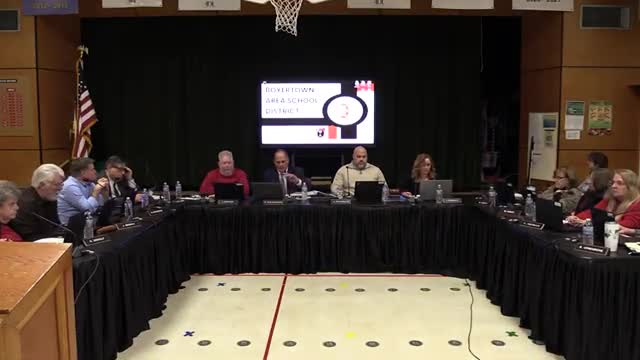Boyertown board weighs reviving planetarium but administration cites roughly $200,000 annual cost
Get AI-powered insights, summaries, and transcripts
Subscribe
Summary
Board members praised the educational value of the district's planetarium at Bridal School East and urged further pursuit of grants and foundation support; administration warned recurring staffing and operating costs would total about $200,000 a year and recommended postponing action.
The Boyertown Area School District Board of School Directors discussed whether to revitalize the planetarium at Bridal School East, with several board members urging further exploration and district administrators advising caution because of recurring costs.
Administrators told the board that recurring annual costs for staffing, benefits, transportation and program delivery could be about $200,000 a year. They also estimated one-time expenses for equipment and upgrades could be roughly $130,000, while the district's education foundation had indicated a potential contribution of about $127,000 toward a projection system.
Board member Michael Brophy said schools should pursue offerings that differentiate the district and described the planetarium as a long-standing asset. "We have the building, we have the planetarium," Brophy said, arguing administrators should continue exploring options. Several other board members echoed interest in pursuing grants and foundation help and suggested phased or alternative staffing models, including partnerships with nearby colleges or running the facility as a regional STEM center.
A district staff member who led the administrative review said the recommendation not to move forward was based on staffing requirements identified after visits to other institutions: the administration's review concluded two full-time certified staff (two FTEs) would be needed to reliably operate a K'12 planetarium and avoid frequent cancellations when a single staffer is absent. That staffing estimate underpinned the district's recurring-cost projection.
Board members proposed alternatives to the district-run model. One suggestion was a partnership or rental arrangement modeled on Montgomery County Community College's NASA center, where an outside organization operates programming while the district schedules student visits. Several trustees also urged pursuing grant funding and foundation support before making a final decision.
The board asked administration to return with more information. Superintendent'level staff said they would present an informational update and potential motion at the March committee-of-the-whole meeting, followed by the legislative meeting if the board wanted to move forward. No formal motion to adopt a planetarium program was taken at the meeting.
The board's discussion distinguished three separate considerations: one-time capital costs (equipment and upgrades), recurring operating costs (staffing and transportation), and potential revenue or cost-offsets from evening programming. Administrators characterized the planetarium as a "nice-to-have" at this time given immediate budget pressures and unmet needs in counseling and special education, but said they would continue to explore grant and partnership options if the board directed them to do so.
